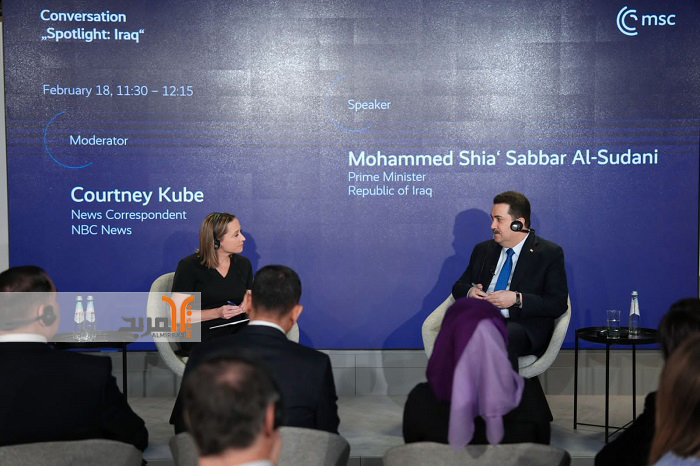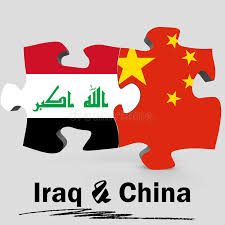Mohamed Shia Al Sudani outlines his government’s domestic and foreign policy objectives
Iraqi Prime Minister Mohammed Shia Al Sudani said Iraq was keen to act as a hub for bringing together countries in the region. Reuters
Tackling corruption in Iraq is key to encouraging investment and restoring public faith in the political process, Prime Minister Mohammed Shia Al Sudani said at the Munich Security Conference on Saturday.
Speaking during a session titled “Spotlight: Iraq”, Mr Al Sudani said his government, which came to power in October last year, also wants to address unemployment, poverty and public services.
“Economic reform is, of course, one of our main focal points,” Mr Al Sudani said, while also listing foreign investment and developing the country’s natural and human resources as key areas the government was working on.
Outlining the work done since he took office in late October with the support of Iran-aligned political factions, Mr Al Sudani said his government was seeking to ensure equality for all Iraqis including religious and ethnic minorities.
He said he expected the dispute over sharing of oil revenue between the federal government and Iraq’s autonomous Kurdish region to be resolved through a law to be passed by the end of the year.
READ MORE
President Sheikh Mohamed meets Iraqi Prime Minister Al Sudani in UAE
Blinken meets Iraqi foreign minister Hussein in Washington
Russia’s Sergey Lavrov visits Iraq for talks on energy and regional issues
Mr Sudani said corruption was a “severe challenge” that affected the rebuilding of Iraq as well undermined faith in the country’s political process, citing low voter turnout in elections.
The government has begun tackling the problem through the reform of anti-graft bodies as well as recovery of stolen funds, some of which he said had been used to fund terrorist groups. This included ISIS, the extremist group that held large areas of northern and western Iraq from 2014 to 2017, he said.
Mr Al Sudani said Iraq had defeated terrorism and no longer needed international fighting forces on the ground but rather consultants and experts to provide training to the Iraqi forces. However, the country is still facing a threat from Syria where ISIS remains active and where thousands of suspected members are jailed. International terror funding networks, particularly in Europe, are another concern, he said.
Only about 500,000 to 600,000 of the millions of Iraqis displaced by the ISIS takeover and the government’s ensuing US-backed military campaign have not yet returned to their homes, the prime minister said. Many of those who fled to the Kurdish region had now settled there, he said, while rebuilding was under way in Nineveh province and the Sinjar region to enable more people to return.
Speaking about the economy, Mr Al Sudani said the government was reviewing progress in attracting investment from Gulf and international investors on a monthly basis.
There was continuing investment in the oil, electricity and commercial sectors but more is needed, he said, highlighting gas as one area with high potential.
Iraq also needs to reduce reliance on the public sector for jobs and commercial contracts, he said.
We have a new social security and retirement law in order to have equality between the private sector and the public sector in Iraq
Mohammed Shia Al Sudani, Prime Minister of Iraq
“We are tackling many paths. On the parliamentary side, we have a new social security and retirement law in order to have equality between the private sector and the public sector in Iraq. This is something that everyone is looking forward to,” he said.
Besides the creation of jobs through outside investment, the government had also created a $400 million fund to provide small and medium-sized loans for Iraqi investors, he said.
Asked about his recent remarks that Iraq could simultaneously have a good relationship with Iran and the US, Mr Al Sudani said neither of Baghdad’s two main allies had voiced concern about his position.
Iraq had long-standing strategic and economic and religious ties with Iran, but also viewed the US as “a partner for the transformation of Iraq and fighting terrorism”, he said.
The Iraqi Prime Minister held a meeting with US Secretary of State Antony Blinken earlier on Saturday, during which Mr Blinken reaffirmed his support for a stable, secure, and sovereign Iraq and Washington’s commitment to co-operation under the US-Iraq Strategic Framework Agreement, according to a statement from the State Department.
It said Mr Blinken also “expressed readiness to support the Prime Minister’s efforts to stabilise and grow Iraq’s economy, including by combating corruption and money laundering. discussed”.
Mr Al Sudani said Iraq was now a “pillar of stability” in the region and aiming “to be a hub for the meeting of everyone, every culture in all countries”.
Baghdad was also keen to continue acting as mediator in talks between Saudi Arabia and Iran.
“This is part of the Iraqi role that we are trying to sustain. I hope that we very soon will be continuing these talks that have unfortunately stopped and I think there is serious interest on both sides to have this under the auspices of Iraq,” he said.
Source: The National , Updated: February 18, 2023, 4:59 PM








Comment here